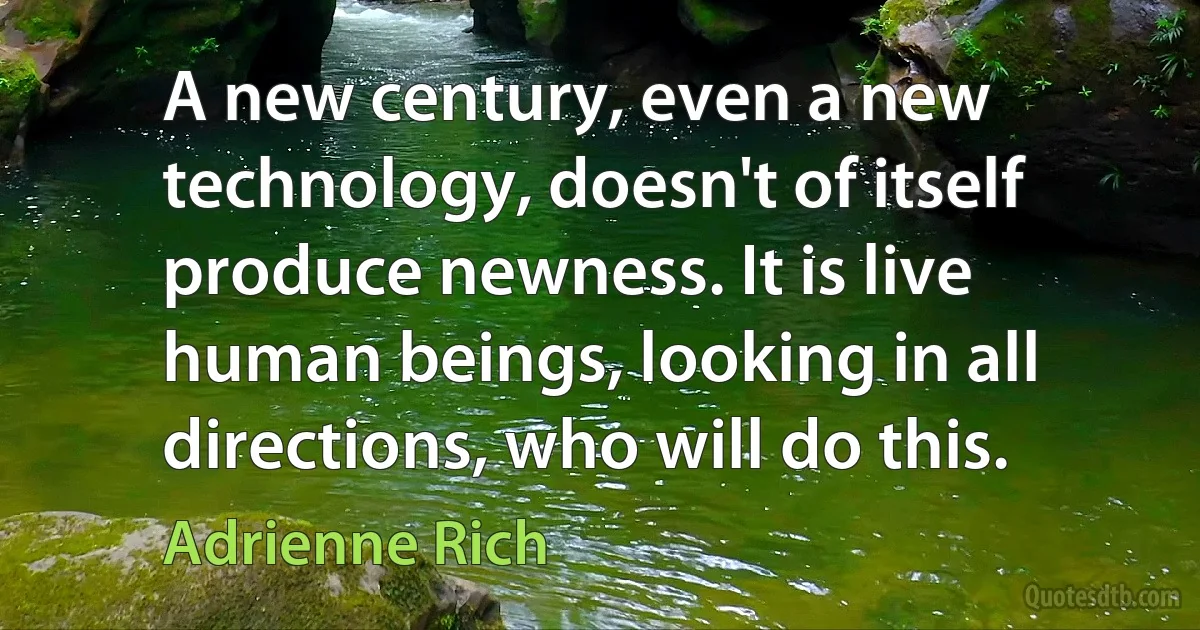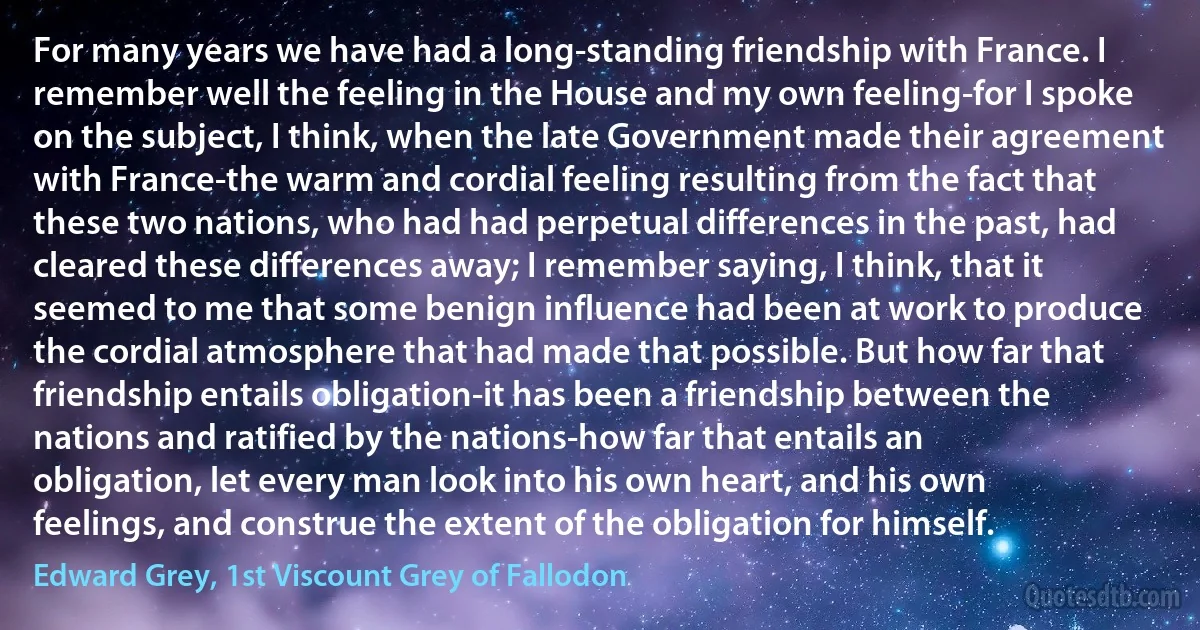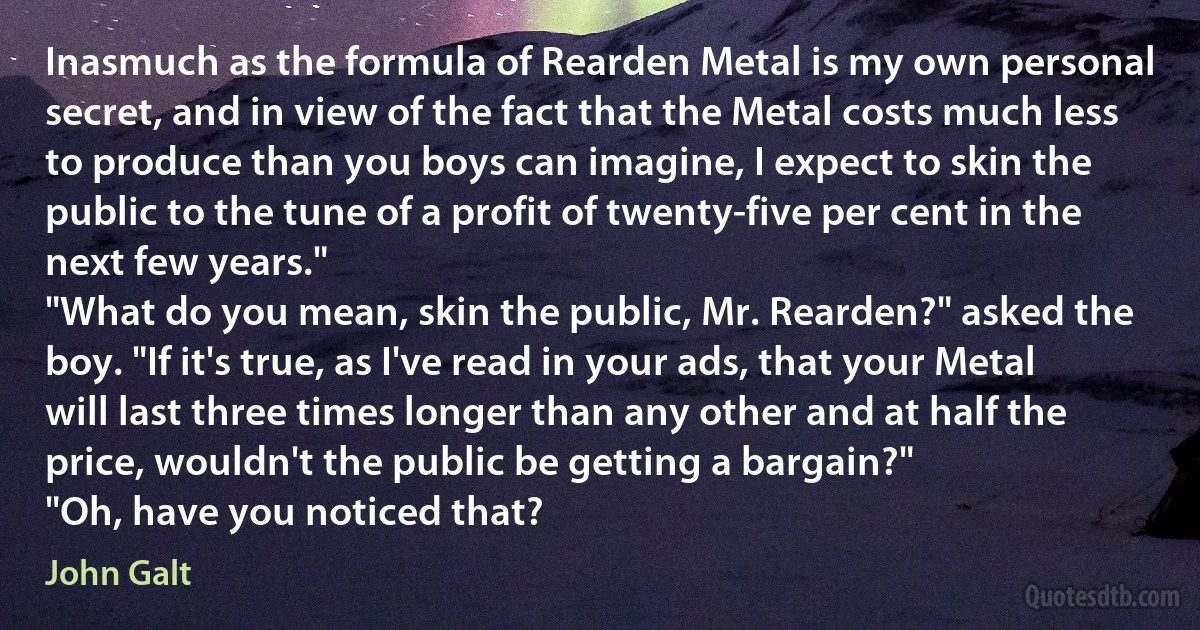Produce Quotes - page 67
We see Russia developing into a strongly centralized, highly nationalistic, intensely militarized state, subjecting policy and public welfare to national and military aims; and we see Benito Mussolini nationalizing more and more enterprises, restricting private initiative more and more, while the economic dictator of Germany becomes, not the capitalist representative, Dr. Schacht, but General Goering, who is a soldier and aviator and who believes that the chief business of Capitalism is to produce more cannons.

Dorothy Thompson
Speaking of an institution such as marriage as natural is, of course, paying it a compliment, the compliment of saying that it meets a fairly central human need. The fact that it is found in some form in every human society is in a way enough to show. But it might be thought that marriage became thus widespread only because it was, like adequate sanitation, a means to an end. This is pretty certainly what Hume thought, as evidenced by his very confused contrast of natural with artificial virtues. He regarded human sagacity simply as the power to calculate consequences, and counted chastity and fidelity, with justice, as artificial virtues, devices designed merely to produce safety and promote utility. In a species as emotionally interdependent as man this view of marriage is nonsense. Pair-formation could never have entered anybody's head as a device deliberately designated to promote utility.

Mary Midgley
I began my book about perestroika and the new thinking with the following words: "We want to be understood". After a while I felt that it was already happening. But now I would like once again to repeat those words here, from this world rostrum. Because to understand us really - to understand so as to believe us - proved to be not at all easy, owing to the immensity of the changes under way in our country. Their magnitude and character are such as to require in-depth analysis. Applying conventional wisdom to perestroika is unproductive. It is also futile and dangerous to set conditions, to say: We'll understand and believe you, as soon as you, the Soviet Union, come completely to resemble "us", the West.
No one is in a position to describe in detail what perestroika will finally produce. But it would certainly be a self-delusion to expect that perestroika will produce "a copy" of anything.

Mikhail Gorbachev
This is a test. Take notes. This will count as 3/4 of your final grade. Hints: remember, in chess, kings cancel each other out and cannot occupy adjacent squares, are therefore all-powerful and totally powerless, cannot affect each other, produce stalemate. Hinduism is a polytheistic religion; the sect of Atman worships the divine spark of life within Man; in effect saying, "Thou art God." Provisos of equal time are not served by one viewpoint having media access to two hundred million people in prime time while opposing viewpoints are provided with a soapbox on the corner. Not everyone tells the truth. Operational note: these sections may be taken out of numerical sequence: rearrange to suit yourself for optimum clarity. Turn over your test papers and begin.

Harlan Ellison
It will be impossible to secure preferential treatment with the colonies without some duty on corn as well as on other articles on food, because these are the chief articles of colonial produce. Whether this will raise the cost of living is a matter of opinion, and there is no doubt that in many cases a duty of this kind is paid by the exporter, and it really depends on the extent of competition among the exporting countries... But, even if the price of food is raised, the rate of wages will certainly be raised in greater proportion. This has been the case both in the United States and Germany. In the former country the availabile balance left to the working man after he has paid for necessaries is much larger than here. These are facts which we have to bring to the notice of the working men generally.

Joseph Chamberlain
We have been building up, not dissipating, overseas assets. The question is whether, while so doing, we have been neglecting our investment at home and particularly that in the public services. There is no doubt, in my mind at any rate, about the ability of a low taxation market-oriented economy to produce consumer goods, even if an awful lot of them are imported, far better than any planned economy that ever was or probably ever can be invented. However, I am not convinced that such a society and economy, particularly if it is not infused with the civic optimism which was in many ways the true epitome of Victorian values, is equally good at protecting the environment or safeguarding health, schools, universities or Britain's scientific future. And if we are asked which is under greater threat in Britain today-the supply of consumer goods or the nexus of civilised public services-it would be difficult not to answer that it was the latter.

Roy Jenkins
Homer was a poet, and knew that one touch of beauty redeems a multitude of sins; Hesiod [the poor poet] was a peasant who grudged the cost of a wife, and grumbled at the impudence of women who dared to sit at the same table with their husbands. Hesiod, with rough candor, shows us the ugly basement of early Greek society-the hard poverty of serfs and small farmers upon whose toil rested all the splendor and war sport of the aristocracy and the kings. Homer sang of heroes and princes for lords and ladies; Hesiod knew no princes, but sang his lays of common men, and pitched his tune accordingly. In his verses we hear the rumblings of those peasant revolts that would produce in Attica the reforms of Solon and the dictatorship of Peisistratus.

Will Durant
You need at this time especially to know that you are fit for something better than slavery and cannon fodder. You need to know that you were not created to work and produce and impoverish yourself to enrich an idle exploiter. You need to know that you have a mind to improve, a soul to develop, and a manhood to sustain.

Eugene V. Debs
Seurat read Delacroix's journals and made notes on his use of colour mixing in his paintings. Delacroix's puzzlement over why blobs of blue and yellow failed to produce green could have prepared Seurat to see in his French translation of Rood's Modern Chromatics an answer to the problem. He [Seurat] mentions in his letter to Fénéon that Ogden Rood's book had been brought to his attention in 1881 (the year it was published in France).. .w:Ogden Rood's chief lesson was to make clear the distinction between coloured lights and coloured pigments.. .However, as [w:Herbert, Robert L.|Herbert]] points out, in 1881 and 1882 Seurat's oil paintings were still in the Barbizon tradition and it was not until 1883 that his palette lightened and not until he started 'Grande Jatte|A Sunday Afternoon on the Island of La Grande Jatte|Grande Jatte' in 1884 that he started to use separate blobs of complementary colour in a clear, conscious manner..

Georges Seurat
I had made up my mind to find that for which I was searching even if it required the remainder of my life. After innumerable failures I finally uncovered the principle for which I was searching, and I was astounded at its simplicity. I was still more astounded to discover the principle I had revealed not only beneficial in the construction of a mechanical hearing aid but it served as well as means of sending the sound of the voice over a wire. Another discovery which came out of my investigation was the fact that when a man gives his order to produce a definite result and stands by that order it seems to have the effect of giving him what might be termed a second sight which enables him to see right through ordinary problems. What this power is I cannot say; all I know is that it exists and it becomes available only when a man is in that state of mind in which he knows exactly what he wants and is fully determined not to quit until he finds it.

Alexander Graham Bell
Perhaps history this century, thought Eigenvalue, is rippled with gathers in its fabric such that if we are situated, as Stencil seemed to be, at the bottom of a fold, it's impossible to determine warp, woof, or pattern anywhere else. By virtue, however, of existing in one gather it is assumed there are others, compartmented off into sinuous cycles each of which had come to assume greater importance than the weave itself and destroy any continuity. Thus it is that we are charmed by the funny-looking automobiles of the '30's, the curious fashions of the '20's, the particular moral habits of our grandparents. We produce and attend musical comedies about them and are conned into a false memory, a phony nostalgia about what they were. We are accordingly lost to any sense of continuous tradition. Perhaps if we lived on a crest, things would be different. We could at least see.

Thomas Pynchon
The reality is that many businesses, large and small, have long used undocumented workers to pad their bottom lines. Just consider the agricultural workforce. In California alone-where the $45 billion-a-year agricultural sector supplies more than half the produce consumed in the United States-between 40 and 50 percent of the workforce is made up of undocumented workers. No wonder California has been the site of some of the most important immigrant labor struggles, brought to the consciousness of many Americans in the 1960s and 1970s by the great United Farm Workers leader, Cesar Chavez. That struggle continues today.

Cesar Chavez
...Jews seem to have superiority as actors, chess-players, doctors, merchants (chiefly financiers), in metaphysics, music, poetry, and philology.... Of course, Jews have no Darwin. It took England 180 years after Newton before she could produce a Darwin, and as Britishers are five times the number of Jews, even including those of Russia, it would take, on the same showing, 900 years before they produce another Spinoza, or, even supposing the double superiority to be true, 450 years would be needed.

Baruch Spinoza
[Y]ou can affect a lot of people with a small amount of information. Therefore, you can change the behavior of many people with a small amount of information. The question then arises as to what kinds of information will produce behavior which is just and disincentivize behavior which is unjust.

Julian Assange
Yet Americans are not visionary, they are not sentimentalists. They want idealism, but they want it to be practical, they want it to produce results. It would be little use to try to convince them of the soundness and righteousness of their institutions, if they could not see that they have been justified in the past history and the present condition of the people. They estimate the correctness of the principle by the success which they find in their own experience. They have faith but they want works.

Calvin Coolidge
In the book 1984, George Orwell pictured a totalitarian society that has become the standard view of the total state of the future. Everyone's life was controlled by computer, and there was a TV camera in every room to monitor everyone's activities... Fortunately, such dramas overlook the fundamentals of economics. The larger the government, the less efficient and productive is the economy. Slaves don't produce with the enthusiasm, incentive, and imagination that free people do. Bureaucratic programs just don't work as intended... So while the totalitarian state may include a TV camera in every room, I doubt that the camera will work.

Harry Browne
When you see that trading is done, not by consent, but by compulsion-when you see that in order to produce, you need to obtain permission from men who produce nothing-when you see that money is flowing to those who deal, not in goods, but in favors-when you see that men get richer by graft and by pull than by work, and your laws don't protect you against them, but protect them against you-when you see corruption being rewarded and honesty becoming a self-sacrifice-you may know that your society is doomed.

John Galt
I studied a good deal in the museum at Naples; the Pompeian paintings are extremely interesting from every aspect. So I am staying in the sun – not to paint portraits but while I am warming myself and looking hard at things I hope I will have acquired some of the grandeur and simplicity of the old masters. Raphael didn't work out-of-doors, but he studied the sunlight all the same – his frescoes are full of it. So, by looking around outside, I have finished by seeing only the broad harmonies, and am no longer preoccupied with the little details, which only extinguish the sunlight, instead of increasing its brilliance. I hope therefore, when I get back to Paris, to produce something which will be the outcome of all these general studies, and to give you the benefit of them [in a letter written during his three-weeks-stay, working with Paul Cezanne at l'Estaque, near Marseille].

Pierre-Auguste Renoir
I think the ratio, R, of the time to sense the dose taken to the time required to take an excessive dose is an important quantity. R is very large for LSD (which I've never taken) and reasonably short for cannabis. Small values of R should be one measure of the safety of psychedelic drugs. When cannabis is legalized, I hope to see this ratio as one of the parameters printed on the pack. I hope that time isn't too distant; the illegality of cannabis is outrageous, an impediment to full utilization of a drug which helps produce the serenity and insight, sensitivity and fellowship so desperately needed in this increasingly mad and dangerous world.

Carl Sagan
Stock-exchange capital is not productive but parasitically hoarded capital. It is no longer tied to the soil but rootless and internationalist; it does not produce but has infiltrated the normal production process in order to drain profits from it. It consist of movable assets, i.e. raw cash; its chief carrier is Jewish high finance, whose goal is to put the producing populace to work, then pocket the proceeds from their labor.

Joseph Goebbels



